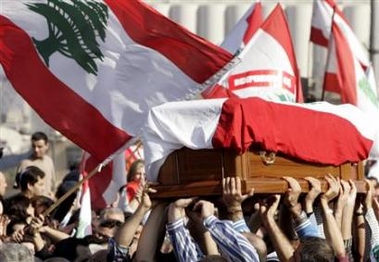|
Angry Lebanese bury assassinated editor
(AP)
Updated: 2005-12-15 08:46
Tens of thousands of Lebanese åK½ï¿½ men and women, Christians and Muslims åK½ï¿½
shouted insults at Syria on Wednesday in an outpouring of anger as yet another
assassinated anti-Syrian campaigner was buried.
Lebanon was brought to a halt by a general strike called in mourning for
editor and lawmaker Gibran Tueni, who was killed along with two bodyguards
Monday in a car bombing, but neighboring Syria largely ignored the events.
Damascus has denied involvement in the slaying.
Doctors, nurses, bankers and businessmen joined political activists and
students to bid farewell to Tueni, the outspoken 48-year-old general manager of
the country's leading An-Nahar newspaper.
"We want to say the truth; Syria killed him!" shouted many among the
flag-waving crowd outside An-Nahar's building in Beirut. "Gibran lives on!"
shouted others.
"Enough blood and killings. They (Syrians) are taking away our best men in
Lebanon," said an enraged Mazen Abdel-Samad, a 25-year-old university student
wearing the red and white scarf that came to symbolize Lebanon's uprising
against Syrian control.
Anti-Syrian groups in Lebanon are counting on public anger over Tueni's
killing to push for ridding the government of remnants of the Syrian era åK½ï¿½
including intelligence operatives åK½ï¿½ and to close ranks in confronting Damascus.
But their choices are limited. The anti-Syrian groups are divided and,
although they hold a majority in Parliament and Cabinet and are in control of
the police, they have not been able to stop the bombing campaign.

Lebanese residents carry the coffin of Gebran
Tueni during his funeral in Beirut December 14, 2005.
[Reuters] | Pro-Syrian President Emile Lahoud has
rejected their calls to resign, and efforts to remove him have been stymied by
disagreements.
Arab League Secretary-General Amr Moussa came to Beirut on Wednesday in an
effort to prevent further deterioration in Lebanese-Syrian relations, and said
he hoped diplomacy could "contain the grave situation."
Moussa goes to Damascus on Thursday, then will return to Beirut.
Police officials estimated the crowd Wednesday at more than 100,000 people.
But other witnesses and observers said they thought it could be as high as
200,000.
The protest and funeral was by far the largest gathering since March 14, when
1 million people filled Beirut's streets to demand that Syria release its hold
on Lebanon. In a speech that day, Tueni called for the withdrawal of Syrian
forces from Lebanon and urged Lebanese Muslims and Christians, often divided
along sectarian lines, to unite.
Syria withdrew its soldiers from Lebanon in April.
Tueni was the fourth prominent anti-Syrian figure to be killed since a series
of bombings began in February with the assassination of former Prime Minister
Rafik Hariri. A previously unknown group claimed responsibility for Monday's
bombing, but Tueni's colleagues and political allies blamed Syria.
While pictures from the funeral were broadcast on Arab and international
television stations, Syrian state television ignored the ceremony.
The strike called by anti-Syrian groups in Lebanon was widely observed. But
in some eastern regions where pro-Syrian Shiite groups Hezbollah and Amal
dominate, the strike call was ignored.
|